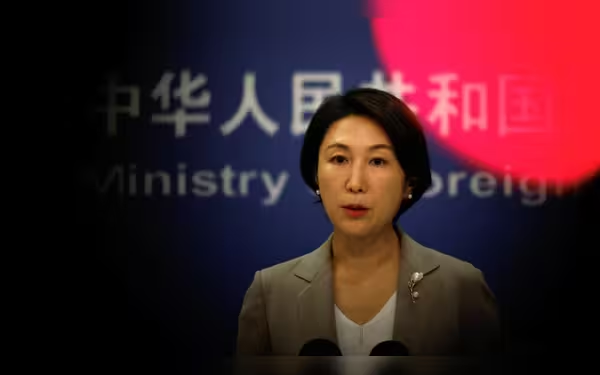Thursday, November 7, 2024 02:49 AM
China Seeks Peaceful Coexistence with US Amid Trump Election Victory
- China emphasizes mutual respect in US relations.
- Trump's potential tariffs raise trade concerns.
- Chinese netizens call for inward-focused US policy.
 Image Credits: channelnewsasia
Image Credits: channelnewsasiaChina expresses desire for peaceful coexistence with the US as Trump nears election victory, amid rising trade tensions and tariff concerns.
In a significant development on the global stage, China has expressed its desire for "peaceful coexistence" with the United States as the presidential election results indicate a potential victory for Donald Trump over Kamala Harris. This statement comes at a time when the relationship between the two superpowers is under intense scrutiny, especially given the ongoing trade tensions and geopolitical rivalries.
During a regular press briefing, Chinese foreign ministry spokeswoman Mao Ning emphasized that China aims to manage its relations with the U.S. based on principles of "mutual respect, peaceful coexistence, and win-win cooperation." This approach highlights China's intention to maintain a stable relationship with the U.S., regardless of the election outcome. Mao further stated, "Our policy toward the United States has been consistent," indicating that China’s stance will not waver based on the political climate in the U.S.
While Mao did not directly address the implications of Trump's potential re-election, she noted that the U.S. presidential election is an "internal affair of the United States." This statement reflects China's diplomatic strategy of not interfering in the domestic politics of other nations. She added that once the election results are officially announced, China would handle related matters according to established practices, leaving the door open for future communications between leaders.
On social media platforms like Weibo, discussions surrounding Trump's election have gained significant traction. Comments such as "Trump, congratulations! Focus on building your beautiful country and stop thinking about interfering with other countries" illustrate the sentiments of some Chinese netizens who are keen on seeing a more inward-focused U.S. policy. However, both Trump and Harris have indicated plans to adopt a tougher stance on China, with Trump proposing tariffs as high as 60 percent on Chinese imports.
The implications of these tariffs are already being felt in the business community, as expressed in comments on Douyin and Weibo. One user lamented, "My family does foreign trade and their world has just collapsed," highlighting the anxiety among those involved in international trade. Another user advised those in foreign trade to consider changing jobs due to the anticipated economic impact of increased tariffs.
As the world watches the unfolding events, it is clear that the relationship between China and the United States will continue to be a focal point of international relations. The desire for "peaceful coexistence" from China suggests a willingness to engage in dialogue, but the looming threat of tariffs and trade restrictions raises questions about the future of this critical partnership. Ultimately, how both nations navigate this complex relationship will have far-reaching consequences not only for their economies but also for global stability.













